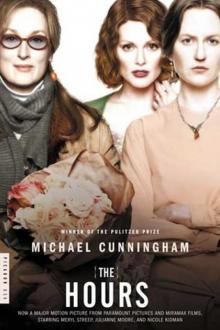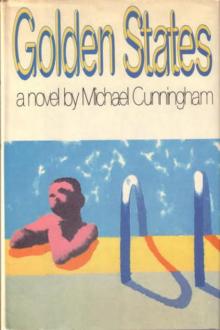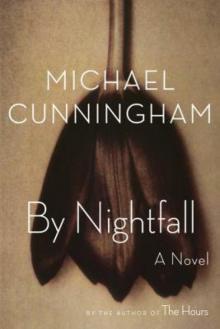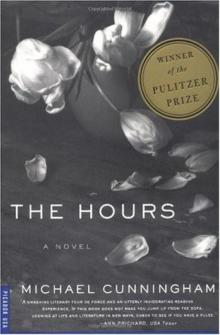- Home
- Michael Cunningham
By Nightfall Page 4
By Nightfall Read online
Page 4
“That’s dramatic.”
“Don’t play dumb.”
“A thousand pardons.”
“They’ll pressure him to do the work in gold, they’ll overpromote him, and in all likelihood he’ll be finished by the time he’s thirty.”
“Or having his retrospective at the Whitney.”
“Some of these kids are ready early. He’s not. He’s developing. He needs someone who’ll push him, but in the right ways.”
“And you think I’m that guy.”
“What I’m saying is, I don’t think you’re an asshole.”
I don’t know, Bette. I’m not as big as some of them, I’m not as rich, and if that means I’m not an asshole, fine.
“I like to think I’m not,” he says. “What makes you think Groff will want to go with me?”
“I’ll talk to him. Then you can talk to him.”
“What’s he like?”
“Sweet. A little oafish. Not the sharpest tack in the box.”
The waitress returns to ask again if they’ve had time to consider the menu. They promise apologetically to look, to decide in a couple of minutes, and they do exactly that. Who wouldn’t want to help this lovely, earnest girl, who’s so far from home, feel like she’s succeeding at posing as a New York waitress?
An hour later, Peter and Bette walk together through the Great Hall at the Met, grand, somnolent portal into the civilized world. Why deny its satisfactions—its elephantine poise, its capacity to excite the very molecules of its own air with a sense of reverent occasion and queenly glamour and the centuries-long looting of five continents? The Hall receives with a vast patience. It’s the mother who will never die, and right up front are her votaries, the women of the central kiosk, elderly for the most part, kind-looking, waiting to offer information from under the enormous floral arrangement (cherry blossoms, just now) that festoons the air over their heads with petal and leaf.
Peter pays the admissions (Bette paid for lunch). They clip on the small metal circles (these things must have a name, what would it be?), he to his jacket and she to the scoop neck of her black cotton sweater, which for a moment draws both their attention to her prominent, freckled clavicle and the miniature gathering of wrinkles, like a puckering of cloth, that have settled into the skin between her breasts. Bette knows that Peter is looking, gives him back a look of what he can only call haggard flirtation—a furious sensuality, not directly sexual but charged with some quality made up of sex and defiance, the sort of look Helen must have aimed at the Trojans. Bette Rice, a queen kidnapped by age and illness.
He times his ascent of the staircase with that of Bette, who climbs at a smoker’s pace. She’s just had a Marlboro Light in front of the museum, and said, in response to the skeptical glance Peter had decided against, “Trust me, a cancer scare is not the time to give up smoking.”
At the top of the stairs, Tiepolo’s Marius continues to triumph. The boy continues banging on his tambourine.
On the way to the contemporary galleries, Peter pauses before the Rodin at the entrance to Nineteenth-Century European. Bette gets a few paces ahead, turns, and comes back.
“Still here,” she says. They came for the Hirst, why is Peter stopping? Hasn’t he seen the Rodin a thousand times?
Peter says, “You know how…”
“Yes?”
“How something pops out at you sometimes?”
“Today, Rodin pops out?”
“Yeah. I don’t know why.”
Bette settles beside Peter with that aspect of mother-alligator calm she can summon. This is probably how she was with her sons when they were small, when they were fascinated by something that bored her—this attitude of informed but charitable willingness. This would be part of why they turned out okay.
She says, “No denying its merits.”
“No.”
Here, as always, is Auguste Neyt, aka The Vanquished, aka The Bronze Age: perfect bronze man-child, exactly life-size, trim and lithe, holding his invisible spear. Rodin was still unknown when he sculpted and cast this naked man, sans Ancient Greek musculature or French devotion to allegory; Rodin a minor figure then but proven right by time—the heroic was dying out, the real was arriving for a long, long stay. Now Rodin has been and gone and yes, of course, he’s part of history, but new artists don’t revere him, no one makes a pilgrimage, you learn about him in school, you pass his sculptures and maquettes on your way to see the Damien Hirst.
Still. It’s fucking bronze, it could last forever (didn’t the Koenig sphere survive 9/11?). Alien archeologists might unearth it one day and really, would it be such bad evidence of who and what we were? Auguste Neyt, centuries dead by then, his name lost but his form preserved, nude, unidealized, merely young and healthy, with his life ahead of him.
“Okay?” Bette says.
“Okay.”
They walk quietly and with purpose by the Carrière and Puvis de Chavannes, past Gérôme’s Pygmalion kissing Galatea. At the gallery’s far end they turn, pass the books-and-gifts kiosk, turn again.
And there it is, the shark, suspended in its pale blue, strangely lovely formaldehyde; there is the lethal perfection of its shape and here is its maw, jagged, big as a barrelhead, the business end—is there any other creature so clearly intended to be a mouth propelled by a body?
It remains a jolt; it still produces that prickle of animal panic along the surface of Peter’s skin. Which is, of course, one of the questions. Who isn’t going to be moved by a thirteen-foot-long dead shark floating in a tank of formaldehyde?
Peter’s stomach lurches. The queasiness is worse after he eats. He should probably go to the doctor.
“Hm,” Bette says.
“Hm.”
It has to do with the immaculate packaging, Peter thinks—the hefty but pristine white steel tank (twenty-two tons), the azure solution in which the creature floats. The shark is so entirely contained, so utterly dead, its eyes opaque, its hide hoarily wrinkled. And yet…
“It’s something, seeing it here,” Bette says.
“It is something.”
The Physical Impossibility of Death in the Mind of Someone Living. Yes. It’s something.
Three girls and a boy, fourteen or fifteen, circle nervously around the tank, appalled, deciding how exactly to mock it. A little boy holds his father’s hand and says, “This is scary?”—posed as a question. A middle-aged couple stands by the shark’s tail, huddled, conferring gravely in what sounds like Spanish, consulting each other, as if they’ve been sent to do something painful but necessary, for the greater good.
Bette says, “This one’s a female.”
“Do you think they should have kept the first one?”
“There was no way Steve Cohen was going to have paid eight million bucks and just watch the goddamned thing disintegrate.”
“No. No way.”
“It’s a little hard to see it at this point,” Bette says. “I mean, there’s the object, and then there’s Hirst’s career, not to mention Hirst himself, and there’s Cohen’s eight million and the Met thinking it’s daring to show something that’s been around almost twenty years…”
The high school kids gather before the shark’s midsection, all but trembling with fear and sexuality and disdain, speaking softly in a private language (Peter catches bits: “—you’re such a handbag—” (handbag, no, he must have misheard) “—never have—” “—Thomas and Esme and Prue—”). One of the girls puts a hand on the glass, pulls it quickly away again. The other two girls shriek and run from the gallery as if their friend has set off an alarm.
Bette strides up to the front of the tank, bends over slightly to see into the shark’s open maw. The girl who touched the glass remains, the boy beside her. She fingers the seam of the boy’s jeans. Young lovers, then. The girl’s face is resolute, small-mouthed, something pious about it—she could be Amish, never mind the Courtney Love T-shirt and green leather jacket. She is a handsome and probably intelligent girl conte
mplating a shark alongside her boyfriend (who is gay, anyone can see it, does he know that yet, does she?), and Peter is briefly in love with her, or anyway with who and what she’ll become (there she is ten years from now, in a tight little sparkly dress, laughing, at a party somewhere), and then the boy whispers to her and they leave, and Peter will never see her again.
Bea is angry with him in a way that feels permanent, but hey, she’s only twenty years old. Still. She’s diminishing, up there in Boston; she’s thin and pale and tightly wound, no boyfriends, no discernible passions beyond her determination to do something practical with her life, her conviction that art is ridiculous, by which she means Peter is ridiculous, by which she means he seduced her, all those years, into loving him too much and Rebecca too little, which she has recently come to understand is the source of her persistent loneliness and intermittent depression, her disappointment in men and her trouble connecting with women.
“It’s impressive,” Bette says, of the shark. “You let yourself think, oh, it’s a gesture, it’s just a dead shark, every natural history museum is full of them, but then you stand in a gallery with it, and, well…”
Bette has grown bottom-heavy with age. She is wearing black Reeboks. As she leans unafraid toward the mouth of the shark, she is touching but not heroic—no, she is perhaps heroic in her way but she is not potent, she does not possess even Ahab’s doomed and fanatic grandeur though she has, in her life, had some measure of his crazy conviction (think of the artists she’s taken on). But now, on a Sunday afternoon at the Met, she is an old woman looking into the mouth of a dead shark.
Peter goes and stands beside her. “It’s an impressive gesture,” he says.
Behind Peter’s and Bette’s dim reflections on the glass, the shark’s jaws gape—there are the rows of lethal, serrated teeth, and beyond, pickled white, is the orifice itself, which takes on the shade of the solution’s blue, grayed and deepened, as it recedes into the shark’s own inner darkness.
Bette has not told Peter the truth. Not the whole truth. The surgeon didn’t get all the cancer, she’s not going to be all right. Peter knows this with a tingling immediacy that’s like the creaturely alertness produced by the shark itself. An infinitesimal length of tape self-erases in his brain, and he’ll never know if he understood at JoJo’s or later that Bette is, in fact, dying, and will do so sooner rather than later. That’s why she’s closing the gallery right now. That’s why Jack is leaving Columbia.
Peter reaches over and takes her hand. It’s more or less involuntary, and only after he’s touched her does he pause to wonder, is this ridiculous, is it melodramatic? Will she rebuke him? Her fingers are surprisingly soft and crepey, an old woman’s. She squeezes his hand with hers, gently and quickly. They hold hands for a few seconds, then part. If the gesture was excessive or false, if it was self-dramatizing on Peter’s part, Bette doesn’t seem to mind, not now, not in front of the shark.
Peter lets himself into the loft. Quarter past four. He goes to the kitchen counter, puts down the drugstore bag that contains the Excedrin and dental floss he’s picked up (why is it so impossible to go out in New York without buying something?), slips off his jacket, hangs it up. As his ears adjust to the particular sing-silence of home, he hears the shower. Rebecca’s here. Good. He’s often as grateful as Rebecca is for a little solitude when he comes home but not now, not today. It’s hard to say what he feels. He wishes it were as simple as sorrow for Bette. It’s hollower than sorrow. It’s a deep loneliness muddled up with some underlayer of jittery fear, who knows what to call it, but he wants to see his wife, he wants to curl up with her, maybe watch something stupid on TV, let the world go dark for the night, let it fall.
Peter walks through the bedroom to the bathroom. There she is, the pink blur of her behind the frosted glass shower door. There’s mortality in the air and sharks in the water but there’s this, too, Rebecca taking a shower, the vanity mirror fogged by steam, the bathroom smelling of soap and that other undersmell Peter can only call clean.
He opens the shower door.
Rebecca is young again. She stands in the stall facing away from Peter, her hair short, her back strong and straight from swimming; she is half hidden by steam and for an instant it all makes impossible sense: Bette’s hand in Peter’s and the Rodin boy-man waiting for the centuries to bury him and Rebecca in the shower sluicing away the last twenty years, a girl again.
She turns, surprised.
It isn’t Rebecca. It’s Mizzy. It’s the Mistake.
Right. The solid square plates of his pectorals, the V of his hips; here is the small dark bristle of pubic hair, the pink-brown jut of his dick.
“Hey,” he says cordially to Peter. Being seen naked by Peter does not, apparently, render Mizzy even remotely uncomfortable.
“Hey,” Peter answers. “Sorry.”
He steps back, closes the shower door. Mizzy has always been shameless, no, more like shame-free, satyrlike, so unembarrassed by nakedness or by biological functions that he makes almost everyone else seem like a Victorian aunt. With the shower door closed Peter can see only the fleshly pink silhouette, and although Peter knows it’s Mizzy (Ethan) he finds himself pausing, thinking of the young Rebecca (striding into the surf, slipping out of a white cotton dress, standing on the balcony of that cheap hotel in Zurich), until he realizes he’s lingered there a second or two longer than he should—Mizzy, don’t get the wrong idea—and he turns to leave. As he does he catches sight of his own ghostly image, the blur of him, skating across the steam-fogged mirror.
HER BROTHER
Rebecca’s family is, in its way, a country unto itself. Peter married into it as he might have married the customs and legends, the peculiar history, of a girl from a small, remote nation. The Taylor family nation would be solvent but not wealthy, devoted to regional dishes and handicrafts, lax about timetables and train schedules, tucked into the declivities of a mountain range daunting enough to have protected it from invaders, immigrants, and most ideas and inventions it did not itself engender. Mizzy would be its wounded patron saint, whose pale, glass-eyed effigy is paraded annually through the streets and into the central square.
Before Mizzy, though… There was, still is, the big old dormered house beginning to go terminally soggy under the accumulated heat and soak of eighty-plus Richmond summers. There is Cyrus (professor of linguistics, a small, quietly confident man with a head like Cicero’s) and Beverly (pediatrician, brisk and ironic, defiantly indifferent to housekeeping). And there were, are, three lovely daughters: Rosemary, Julianne, and Rebecca, five years apart. Rose was the beauty, solemn, not unfriendly but not available, either; the girl for whom some older boy with a car was always waiting. Julie was less stunning but more easily amused, a one-of-the-guys girl, loud and funny, a champion gymnast, unapologetically sexual. And then there was Rebecca, born famous thanks to her two older sisters; Rebecca, who was small and pale, gamine, the least beautiful but most intelligent; who had the same aloof, guitar-playing boyfriend since the eighth grade; whose girlhood is epitomized (for Peter) by the yearbook photo in which she, wearing the homecoming crown and holding homecoming roses, stands laughing (who knows why, maybe at the absurdity of where she finds herself) in a little sparkly dress, flanked by the two runners-up, the princesses, who smile mightily for the camera, and who are slightly stolid in their beauty, unremarkable, descendants of those sturdy “marriageable” girls in whom Jane Austen was not particularly interested.
And then. When Rebecca was about to graduate from high school, when Julie was in her second year at Barnard and Rose was already thinking of divorce, the Mistake arrived.
Beverly had had her tubes tied years before. She was forty-five; Cyrus was past fifty. Beverly said, “He must have been desperate to be born.” This statement was taken seriously. She was an expert on children, a doctor of children, and not prone to romances about them.
Peter had met Mizzy when Rebecca brought him for the first time to Richmond. He was ner
vous about meeting her family, embarrassed over the putative note of impropriety—wasn’t it a little creepy for a graduate student to date an undergraduate from his seminar, even if he had waited until after the semester’s end? Rebecca’s father was a professor, could Peter really and truly believe Rebecca when she assured him that her father didn’t disapprove?
“Just shut up,” she told him as the plane descended. “Stop worrying. Right now.”
She had that intoxicating, young-girl certainty; she had that Virginia lilt. Jest stop warying. Raht now. She might have been a nurse in a war.
He promised to try.
Then they were off the plane and there was Julie, vital and friendly in a cowgirl way, waiting for them outside the airport in the family’s old Volvo.
And then, there was the house.
The photo Rebecca had shown Peter had prepared him for its decrepit grandeur—its tangles of wisteria and deep, shadowy front porch—but not for the house in situ, not for the shabby wonders of the entire block, one lovely old matronly house after another, some better cared for than others but none done over or restored—it apparently wasn’t that kind of neighborhood; Richmond probably wasn’t that kind of city.
“My God,” Peter said, as they pulled in.
“What?” Julie asked.
“Let’s just say it’s a wonderful life.”
Julie lobbed a quick glance at Rebecca. Oh, right, one of those very, very clever boys.
In fact, he hadn’t meant to sound cynical, or even particularly clever. Far from it. He was falling in love.
By the end of the weekend, he’d lost count of his infatuations. There was Cyrus’s study—a study!—with its profoundly comfortable swaybacked armchair, in which it seemed you could sit and read forever. There was Beverly’s applauded (if failed) attempt to impress Peter by baking a pie (which was known afterward as “that goddamned inedible pie”). There was the upstairs window through which the girls had escaped at night, the three lordly and lazy old cats, the shelves crowded with books and elderly board games and seashells from Florida and framed, rather haphazard-looking photographs, the faint smells of lavender and mildew and chimney smoke, the wicker porch swing on which someone had left a rain-bloated paperback copy of Daniel Deronda.

 The Hours
The Hours Land's End: A Walk in Provincetown
Land's End: A Walk in Provincetown Golden States
Golden States A Wild Swan
A Wild Swan A Home at the End of the World
A Home at the End of the World Flesh and Blood
Flesh and Blood Specimen Days
Specimen Days Land's End
Land's End By Nightfall
By Nightfall Hours
Hours